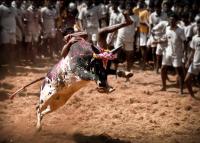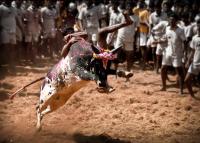The Bench and the Bar
Bar, Bench & Litigation
 The legislature and judiciary have been mostly aligned in spirit. Judges have been some of the most sympathetic towards environmental causes in recent years, developing a young environmental jurisprudence.
The legislature and judiciary have been mostly aligned in spirit. Judges have been some of the most sympathetic towards environmental causes in recent years, developing a young environmental jurisprudence.
Bar, Bench & Litigation
 A fascinating article in the New York Times last week (6 January) profiled Rob Bilott, a lawyer at a Cincinatti-based corporate law firm, who “became DuPont's worst nightmare”…
A fascinating article in the New York Times last week (6 January) profiled Rob Bilott, a lawyer at a Cincinatti-based corporate law firm, who “became DuPont's worst nightmare”…
SCOI Reports
 The Supreme Court has stayed the Centre’s notification that allowed Central Government’s notification allowing Jallikattu in Tamil Nadu.
The Supreme Court has stayed the Centre’s notification that allowed Central Government’s notification allowing Jallikattu in Tamil Nadu.
Bar, Bench & Litigation
A magisterial court here on Monday sent Unitech chairman, two managing directors and a director to 14 days judicial custody in alleged cheating cases filed by two investors but the sessions court later granted the three interim bail.
Additional Chief Metropolitan Magistrate Gaurav Rao denied bail to Unitech chairman Ramesh Chandra, MDs Sanjay Chandra and Ajay Chandra and group director Minoti Bahri after they appeared before him on pursuance of non-bailable warrant issued against them, and ordered they be sent to judicial custody till 25 January.
Later they moved a bail application before Additional Sessions Judge Vimal Kumar Yadav, who granted them interim bail till 14 January.
The sessions judge asked them to furnish a personal bond of Rs one lakh and a surety of like amount each.
A complaint was filed by chartered accountant Sanjay Kalra and his business partner Deepak Wadhwa, claiming they had booked a property in Habitat Apartments in Greater Noida developed by Unitech Ltd but were not given possession.
Despite the court’s earlier order, Unitech has not refunded them the complete payment, they said in the complaint.
Bar, Bench & Litigation
The Supreme Court on Monday said that unless a temple had a constitutional right, it could not prohibit the entry of the women pilgrims to offer worship.
A bench of Justice Dipak Misra, Justice Pinaki Chandra Ghose and Justice NV Ramana said this in the course of the hearing of a petition by the Indian Young Lawyers Association challenging the Sabrimala Ayyappan Temple’s custom of prohibiting the entry of women devotees between the age of 10 years and 50 years.
Directing that it would examine the challenge to the custom prohibiting the entry of women of this age group, the court observed that a “temple can’t prohibit entry except on the basis of religion. Unless you have constitutional right you can’t prohibit the entry”.
The court directed the next hearing of the matter on 8 February.
The ruling immediately divided the faithful into two camps -- those who want to retain the present system and those who want that women of all age groups should be allowed entry into the Sabarimala temple.
"Even though god does not differentiate between man and woman, as far as Sabarimala temple and its traditions are concerned, it has a well thought out process and a system," Kalidasan Namboodiripad, a tantric priest in Kerala, told IANS.
"The fulcrum of the Sabarimala pilgrimage revolves around a 41-day penance. Keeping that in mind, the question of women being able to do that cannot happen because it is not possible and practical," he added.
Situated on the mountain ranges of the Western Ghats at 914 metres above sea level, the Sabarimala temple is four kilometres uphill from Pamba river in Pathanamthitta district, around 100 km from Thiruvananthapuram.
The temple, which bars the entry of women who have attained puberty, is accessible only on foot from Pamba.
Till a few years back, it was open only for two months -- from mid-November to mid-January. Now it is kept open for five days every month. It draws millions of devotees, mainly from southern India.
Former Devasom minister and CPI-M legislator G. Sudhakaran said women should be allowed entry into the Sabarimala temple. He recalled that the Left government had said so to the Supreme Court in 2008.
"Where men can enter, women also should and can enter," Sudhakaran said.
But Kantereru Rajiveru, the Sabarimala temple thantri, defended the bar on women.
"A decision on what should be told to the court has to be taken only after discussions with all concerned as faith is of prime importance," he said.
Kerala Devasom Minister and Congress leader V.S. Sivakumar told reporters that the government would look into all aspects before returning to the Supreme Court.
With the two-month temple season on, even devotees seemed to be split.
"What's wrong if women also come and pray here? It should be open to women also so that there can be family pilgrimages," said a male pilgrim at the foothills of the temple.
But a 43-year-old woman said she was a Lord Ayyappa devotee and "somehow I feel that women need not be permitted to enter".
"Traditions and customs cannot be addressed by a court of law," said the homemaker in Thiruvananthapuram.
Strongly backing the existing custom, Rahul Easwar told IANS in Chennai that there were other Ayyappa temples women of all age groups could go to.
Shoba Warrier, a journalist in Chennai, told IANS: "If the temple does not want women to come, then so be it. There are other temples for us to go."
According to Warrier, the argument that Ayyappa was a celibate and hence young women were not allowed may not be right as there was no such bar on visiting other celibate Hindu gods such as Hanuman.
In 2006, all hell broke loose when Kannada actress Jaimala claimed she had touched the famed Sabarimala deity in 1987, violating a age-old temple tradition.
Bar, Bench & Litigation
The Supreme Court on Monday said that unless a temple had a constitutional right, it could not prohibit the entry of the women pilgrims to offer worship.
A bench of Justice Dipak Misra, Justice Pinaki Chandra Ghose and Justice NV Ramana said this in the course of the hearing of a petition by the Indian Young Lawyers Association challenging the Sabrimala Ayyappan Temple’s custom of prohibiting the entry of women devotees between the age of 10 years and 50 years.
Directing that it would examine the challenge to the custom prohibiting the entry of women of this age group, the court observed that a “temple can’t prohibit entry except on the basis of religion. Unless you have constitutional right you can’t prohibit the entry”.
The court directed the next hearing of the matter on 8 February.
Bar, Bench & Litigation
The Madurai Bench of the Madras High Court on Monday stayed its earlier order directing the Tamil Nadu government to enforce dress code for devotees visiting temples under its control.
The high court bench issued an interim stay on an appeal filed by the Tamil Nadu government against the November 2015 single-judge order to implement the dress code.
The high court in November 2015 had ordered wearing of “decent clothes” at temples.
According to these orders, male devotees are to wear shirts, dhotis or trousers while females are expected to wear sarees and other traditional attire.
Wearing of ‘lungis’ (wraparounds), bermudas, jeans and tight leggings are banned.
SCOI Reports
 The Supreme Court bench comprising the Chief Justice TS Thakur, and Justices AK Sikri and R Banumathi, is set to hear as many as five writ petitions challenging the validity of the notification issued by the Union Ministry of Environment, Forests and Climate Change on 7 January permitting the holding of jallikattu and other related festivals involving the performance of bulls in religious festivals, despite the Supreme Court’s 2014 judgment holding it illegal.
The Supreme Court bench comprising the Chief Justice TS Thakur, and Justices AK Sikri and R Banumathi, is set to hear as many as five writ petitions challenging the validity of the notification issued by the Union Ministry of Environment, Forests and Climate Change on 7 January permitting the holding of jallikattu and other related festivals involving the performance of bulls in religious festivals, despite the Supreme Court’s 2014 judgment holding it illegal.
Bar, Bench & Litigation
115 new high court judges could be soon appointed, as per plans expressed by union law minister DV Sadananda Gowda, reported the Express.
Gowda said that the 453 high court judge vacancies which are there in India at the moment, will increase to 472 by the end of June.
He added that he recently met and requested Chief Justice of India TS Thakur to fill up 115 of those posts, and also said that 87 new additional judges are also in his appointment plans.
Bar, Bench & Litigation
The Bar Council of Tamil Nadu and Puducherry’s disciplinary committee refused to revoke or stay its order suspending 10 lawyers for professional misconduct, citing lack of jurisdiction, reported the Business Standard.
The committee comprising of chairman R Arunachalam and members K K S Ramachandran and R Ajay Kumar commented that the remedy for the lawyers is to approach Bar Council of India and that “the duty cast on the disciplinary committee is to inquire and dispose of only the suo motu complaint initiated as per the resolutions passed by the Bar council”
The state bar council has to date suspended at least 45 lawyers for alleged professional misconduct. 35 out of these were suspended by November 2015.
The present batch of 10 suspended lawyers submitted in their petition that the continued suspension is adversely affecting their practice and requested stay of prohibitory orders which have been in force for almost two months now.